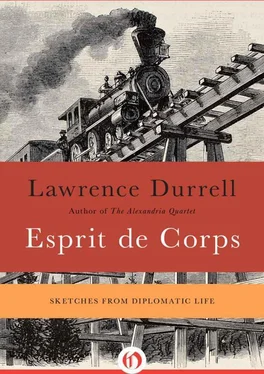We drove thoughtfully up the ill-paved streets of the capital and down Knez Mihailova to the only hotel set aside for foreign visitors (all the others had been turned into soup-kitchens and communal eating-houses). He was not at the hotel. I was standing at the desk, deep in thought, when the circular swing-doors of the hotel began to revolve, at first with slowness, then with an ever-increasing velocity which drew the eyes of the staff towards them. Somebody not too certain of his bearings was trying to get into the hotel. It seemed to me that he was rather over-playing his hand. By now the doors were going round so fast that one thought they would gradually zoom up through the ceiling, drawn by centrifugal force. Ponting was inside, trapped like a fly in amber. I caught sight of his pale self-deprecating face as he rotated grimly. It was set in an expression of forlorn desperation. How had this all come about? Could he have mistaken these massive mahogany doors for a bead curtain? Impossible to say. He was still holding his banjo to his bosom as he swept round and round. There was an impressive humming noise as of a nuclear reactor reacting, or of a giant top at full spin. Ponting looked dazed but determined, like a spinster trapped in a wind-tunnel. A small crowd of servants formed at a respectful distance to observe this phenomenon. Then without warning the second secretary was catapulted out of the swing-doors into our midst, like someone being fired out of a gun into a net. We recoiled with him, falling all over the staircase. For a brief moment his face expressed all the terror of a paralytic whose wheel chair has run away with him and is heading straight for the canal. Then he relaxed and allowed himself to be dusted down, gazing anxiously at his banjo all the time. “Thank God, Ponting, at last you’re here,” I said. I don’t know why I should take the name of God in vain at a time like this; the words just slipped out.
He introduced himself in rather a mincing fashion. His eyes were certainly glassy. I put him down as a rather introverted type. I must say, however, that his opening remark “could not but” (as we say in despatches) fill me with misgiving. “This ‘ slivovitza ’,” he said hoarsely, “it’s a damn powerful thing. I’m practically clairvoyant, old man. You mustn’t be shirty with old Ponting.” He wagged a finger forlornly, helplessly. He looked as if he too needed to feel loved and wanted.
Physically he was on the small side, pigeon-chested and with longish arms which ended in fingers stained bright yellow with nicotine. He had the mournful innocent eyes of a mongrel. “Ponting,” I said, “you’d better have a little rest before dinner.” He did not protest, but leaning heavily against me in the lift he said under his breath, but with conviction: “If ever I get the Nobel Prize it won’t be for nuclear physics.” In my heart of hearts I could not help agreeing with him.
He laid himself out on his bed, kicked off his shoes, folded his arms behind his head, closed his eyes and said (in the veritable accents of Charlie McCarthy): “Quack. Quack. Quack. This is Ponting calling.” Then in a different voice: “Did you say Ponting? Surely not Ponting.” Then reverting again to the dummy he so much resembled: “Yes Ponting. The Ponting, Ponting of Pontefract.”
“Ponting,” I said severely.
“Quack Quack,” responded the dummy.
“Ponting, I’m going,” I said.
He opened his eyes and stared wildly round him for a moment. “Is it true that the Ambassador lives on nightingale sandwiches?” he asked. There were tears in his eyes. “The Daily Express says so.” I gave him a glance of cold dignity.
“I shall speak to you tomorrow,” I said, “when you are sober.” I meant it to sting.
By eleven o’clock next morning Ponting had not appeared and I sent the office car for him. He was looking vague and rather scared and had a large woollen muffler round his throat. His eyes looked as if they were on the point of dissolving, like coloured sweets. “Old man,” he said hoarsely, “was there something you wanted?”
“I wanted to take you to H.E., but I can’t take you looking like an old-clothes-man.” He gazed down at himself in wonder. “What’s wrong with me?” he said. “I bet you haven’t got a shirt on under that scarf.” I had already caught a glimpse of a pyjama jacket. “Well, anyway,” said Ponting, “I can sign the book, can’t I?”
I led him shambling through the Chancery to the Residence which I knew would be deserted at this hour. He made one or two hypnotist’s passes at the Visitors’ Book with streaming pen and finally delivered himself of a blob the size of a lemon. “It was the altitude,” he explained. “My pen exploded in my pocket.” I was busy mopping the ink with my handkerchief. “But you came by train,” I said, with considerable exasperation, “not by air.” Ponting nodded. “I mean the altitude of the Leaning Tower of Pisa,” he said severely.
I led him back to the Chancery door. “Can I go back?” he asked humbly. “It takes a few days to acclimatize in a new post; H.E. won’t be shirty with old Ponting, will he?”
“Go,” I said, pointing a finger at the iron gates of the Embassy, “and don’t come back until you are ready to do your job properly.”
“Don’t be shirty, old boy,” he said reproachfully. “Ponting will see you through.”
“Go,” I said.
“In my last post,” said Ponting in a brooding hollow sort of way, “they said I was afflicted with dumb insolence.”
He traipsed down the drive to the waiting car, shaking his head sadly.
I was contorted with a hideous sense of desolation. What was to be done with a ventriloquist who played the banjo and spent half his time talking like a duck?
I went into the Chancery and took down the F.O. List to examine Ponting’s background. His foreground had become only too apparent by now. He had had a number of posts, none of which he had held for more than a month or so; he had been moved round the world at breakneck speed, presumably leaving behind him in each town the indelible scars of a conduct which could only be excused by reference to the severest form of personality disorder. “Bitter fruit,” I said to Potts the archivist. “Look at this character’s record.” He put on his spectacles and took the book from me. “Yes,” he said. “In every post it would seem to be a case of retired hit-wicket. Poor Ponting!”
“Poor Ponting!” I said angrily. “Poor me!”
After that I did not see Ponting for several weeks. Once, late at night, my Head of Chancery surprised him in the lounge of his hotel doing a soft shoe routine and playing the banjo to a deeply attentive audience of partly sentient journalists. The heavy smell of plum brandy was in the air. In those days it cost about fourpence a glass. Ponting did a little song, a pitiful little spastic shuffle, and brought the performance to an end by pulling out his bow tie to the distance of a yard before letting it slap back on to his dicky. Antrobus, then first secretary, witnessed all this with speechless wonder. “By God,” he said fervently, “never have I seen an Embassy let down like this. He popped his cheek at me in a dashed familiar fashion and said he had once acted in a pierrot troupe on Clacton pier. I couldn’t bring him to his senses. He was …” words failed him. He reported the matter to H.E. who, from the armoury of his diplomatic experience, produced the word which had eluded Antrobus. “Bizarre,” he said gravely. “I gather this fellow Ponting is a little bizarre.”
“Yes, sir,” I said.
“It’s awfully peculiar,” he said. “Your predecessor was an Oxford Grouper. He was bizarre too. At press conferences he would jump up and testify to the most awful sins. Finally the press protested.” He paused. “If you don’t mind my saying so,” he said, “a large proportion of the Information Section in the F.O. seems a bit … well, bizarre.” I could see that he was wondering rather anxiously what my particular form of mental trouble might be.
Читать дальше












